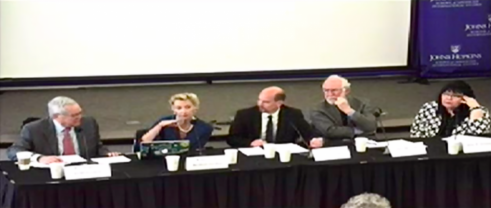Peacebuilding Approaches and Processes in Ukraine
Tuesday, April 8th
9:30 am to 11:00 am
Johns Hopkins University SAIS
Kenney Auditorium
1740
Massachusetts Ave NW
Washington D.C. 20036

Click here to watch the presentation.
Meeting Overview:
Most discussions of the crisis in Ukraine have been dominated by strategic power considerations, especially given the involvement of the United States, the European Union, and Russia in Ukranian affairs. But it is also important to think about what practical processes are needed to produce a just and sustainable resolution of conflicts among Ukranian groups, as well as among interested outside parties. How can Ukranians be empowered to create the kind of society and polity that they want? How can outside interests be recognized and honored without making Ukraine a target for continual proxy struggles? This CRPF is devoted to seeking answers to these vital but often under-studied questions.
Speakers:
Dr. Idil P. Izmirli is a Visiting Scholar & Adjunct Professor at George Mason University’s School for Conflict Analysis and Resolution and the Crimea analyst for the Eurasia Daily Monitor, Jamestown Foundation. Since 2002 she has been working in Crimea on various research grants from the Social Science Research Council (SSRC), the Woodrow Wilson International Center for Scholars’ Kennan Institute, IREX, Fulbright, and the Regional Policy Symposium on Regional Security in Eastern Europe and Eurasia Junior Scholarship, as well as two consecutive fellowships from George Mason University’s “Partnership for Conflict Resolution Development in Ukraine” program, supported by the US Department of State, through which she took part in launching the Crimean Institute of Peace as well as a student-run university mediation and dispute resolution center. In 2012, she was hired as an expert by the Organization for Security and Cooperation in Europe’s (OSCE) High Commissioner on National Minorities (HCNM) to assess the needs and to prepare a report on the Integration of Formerly Deported People in Crimea, Ukraine, which was published on August 16, 2013. In 2013, for the third time in a row, she was awarded an IREX STG (Title VIII grant) for her continuing research in Crimea.
Karina V. Korostelina is Associate Professor and Director of the Program on History Memory and Conflict at the School for Conflict Analysis and Resolution at George Mason University. She has taught at National Taurida University in Ukraine. She is Chair of the Peace Culture and Communication Commission of the International Peace Research Association. Prof. Korostelina is a social psychologist who focuses on social identify and identify-bsed conflicts, nation building processes, the relationships between Muslim and non-Muslim populations, and on the role of history in conflict and post-conflict societies. She has received numerous grants from Fulbright, Eckert Institute, Kennan Institute, Woodrow Wilson Internationial Center for Scholars, Central European University, MacArthur Foundation, Luce Foundation, Soros Foundation, Ebert Foundation, US Institute of Peace, and the Council of Curope. She has published more than 80 articles and chapters, and is author or editor of 13 books.
Chris Mitchell is Professor Emeritus of Conflict Analysis and Resolution at S-CAR, George Mason University. He has held academic positions at London University, the University of Southampton and City University, London as well as teaching at the University of Southern California, Brigham Young University and the University of Maryland. He was on the teaching faculty of S-CAR for 17 years and was the School's Director for four of those. Most recently, together with his colleagues Wallace Warfield and Kevin Avruch, plus a group of highly talented S-CAR students, Chris Mitchell has headed the School's “Local Zones of Peace” project, which involves delineating and analysing local communities’ efforts to establish neutral and secure “zones of peace” in countries suffering from protracted conflicts, such as the Philippines, Colombia and El Salvador. Professor Mitchell is currently supervising doctoral dissertations and working on a new textbook that summarises the current state of our knowledge of the overall field of “Conflict Analysis & Resolution” – a replacement for his “classic” The Structure of International Conflict. Together with S-CAR alumnus Dr. Landon Hancock, he is editing a book of papers arising from the Zones of Peace Group’s research, tentatively entitled Seeking Sanctuary. He holds degrees in Economics, International Relations, and History from University of London.
Moderator:
Richard E. Rubenstein is University Professor of Conflict Resolution and Public Affairs at George Mason University. He is a former director and senior faculty member of George Mason’s School of Conflict Analysis and Resolution. Professor Rubenstein was educated at Harvard College, Oxford University (where he was a Rhodes Scholar), and Harvard Law School. Before coming to S-CAR in 1987 he practiced and taught law in Washington, DC and was a professor of political science in Chicago. He is the author of eight books on political and religious violence and conflict resolution,the most recent of which is Reasons to Kill: Why Americans Choose War (Bloomsbury Press, 2010).
About This Forum:
Since 1999, the Conflict Prevention and Resolution Forum (CPRF) has provided a monthly platform in Washington for highlighting innovative and constructive methods of conflict resolution. CPRF’s goals are to (1) provide information from a wide variety of perspectives; (2) explore possible solutions to complex conflicts; and (3) provide a secure venue for stakeholders from various disciplines to engage in cross-sector and multi-track problem-solving. The CPRF is co-sponsored by a consortium of organizations that specialize in conflict resolution and/or public policy formulation.









